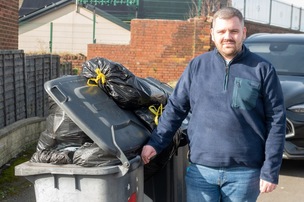A MAN who had his stomach removed because of a rare gene mutation is warning others they may be carrying a ‘ticking time bomb’.
Richard Adam Shaw - who goes by Adam - discovered in 2017 that he suffers with a mutation of the CDH1 gene, after doctors told him to get tested when he lost two uncles and one aunt to a rare form of stomach cancer in 13 years.
This mutation is hereditary and associated with diffuse gastric cancer (HDGC) syndrome, which dramatically increases the risk of developing stomach and breast cancer.
“Doctors thought that it was strange that three relatives all died from the same rare form of cancer,” Adam told the Chronicle.
“With normal stomach cancer you have a tumour inside the stomach, so doctors can use a camera to find the tumour then do a biopsy to test.
“What they had though meant that they had cancer on the outside of the lining, making it much harder to find.
“My dad has lots of brothers and sisters and they all got tested - they found out that my dad had this gene mutation that causes it.”
Adam also got tested, and after being found to have the same mutation decided to get in touch with a researcher from Cambridge University who specialises in the syndrome.
She ran multiple tests and after a few months of studies came back to Adam with bad news.
“I was called back to Cambridge to see this huge team of people.
“When I saw them all I knew it wouldn’t be good news.
“They told me that if I didn’t get my stomach removed I’d die in two to three years.”
In 2018, at only 32 years old, Adam had his stomach removed - after doctors discovered 52 areas of cancer in his stomach.
Alongside him, his father and two cousins had the same operation.
In the six years since, Adam has suffered a variety of complications due to the life-altering procedure, though has managed to avoid the death sentence he received all those years ago.
“Doctors described it like a very extensive gastric band,” Adam added.
“When you normally eat, food goes from your oesophagus to the stomach, where it churns for hours before going to the intestine.
“They removed my stomach and connected the oesophagus straight to the intestine.
“I can still eat normally, but have to do it little and often - I snack through the day now, it was hard to adjust.
“I’ve had operations on my intestine since the removal due to complications and just recently had my gallbladder removed as well because of gallstones.”
Now that he’s stable, Adam is hoping that the details of his story will help raise awareness and save others.
He said: “It’s not a common thing, but there are people out there who have this mutation and don’t know about it.
“It’s literally a ticking time bomb.
“If you have a family history of stomach cancer, call a doctor and get tested.”



























